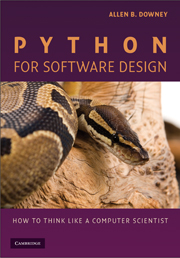Book contents
- Frontmatter
- Contents
- Preface
- Python for Software Design
- 1 The Way of the Program
- 2 Variables, Expressions, and Statements
- 3 Functions
- 4 Case Study: Interface Design
- 5 Conditionals and Recursion
- 6 Fruitful Functions
- 7 Iteration
- 8 Strings
- 9 Case Study: Word Play
- 10 Lists
- 11 Dictionaries
- 12 Tuples
- 13 Case Study: Data Structure Selection
- 14 Files
- 15 Classes and Objects
- 16 Classes and Functions
- 17 Classes and Methods
- 18 Inheritance
- 19 Case Study: Tkinter
- Appendix
- Index
Appendix
Published online by Cambridge University Press: 05 June 2012
- Frontmatter
- Contents
- Preface
- Python for Software Design
- 1 The Way of the Program
- 2 Variables, Expressions, and Statements
- 3 Functions
- 4 Case Study: Interface Design
- 5 Conditionals and Recursion
- 6 Fruitful Functions
- 7 Iteration
- 8 Strings
- 9 Case Study: Word Play
- 10 Lists
- 11 Dictionaries
- 12 Tuples
- 13 Case Study: Data Structure Selection
- 14 Files
- 15 Classes and Objects
- 16 Classes and Functions
- 17 Classes and Methods
- 18 Inheritance
- 19 Case Study: Tkinter
- Appendix
- Index
Summary
Different kinds of errors can occur in a program, and it is useful to distinguish among them in order to track them down more quickly:
Syntax errors are produced by Python when it is translating the source code into byte code. They usually indicate that there is something wrong with the syntax of the program. Example: Omitting the colon at the end of a def statement yields the somewhat redundant message SyntaxError: invalid syntax.
Runtime errors are produced by the interpreter if something goes wrong while the program is running. Most runtime error messages include information about where the error occurred and what functions were executing. Example: An infinite recursion eventually causes the runtime error “maximum recursion depth exceeded.”
Semantic errors are problems with a program that runs without producing error messages but doesn't do the right thing. Example: An expression may not be evaluated in the order you expect, yielding an incorrect result.
The first step in debugging is to figure out which kind of error you are dealing with. Although the following sections are organized by error type, some techniques are applicable in more than one situation.
SYNTAX ERRORS
Syntax errors are usually easy to fix once you figure out what they are. Unfortunately, the error messages are often not helpful. The most common messages are SyntaxError: invalid syntax and SyntaxError: invalid token, neither of which is very informative.
Information
- Type
- Chapter
- Information
- Python for Software DesignHow to Think Like a Computer Scientist, pp. 231 - 240Publisher: Cambridge University PressPrint publication year: 2009
